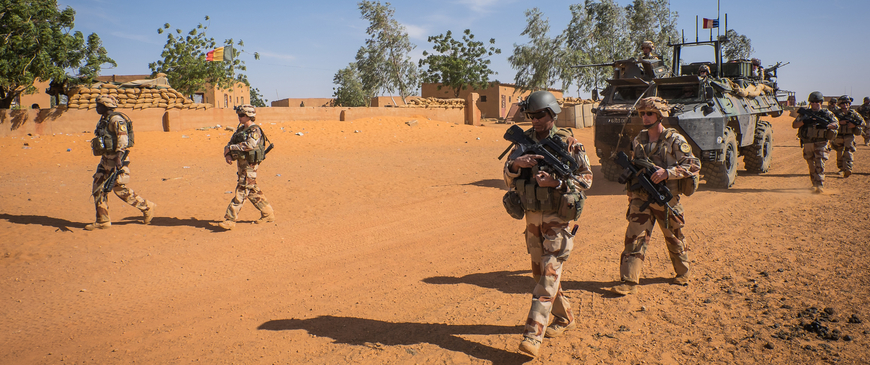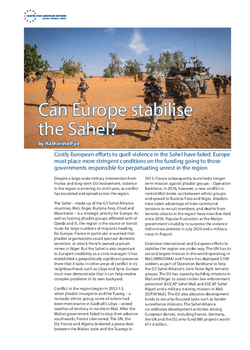
Can Europe stabilise the Sahel?
Costly European efforts to quell violence in the Sahel have failed. Europe must place more stringent conditions on the funding going to those governments responsible for perpetuating unrest in the region.
Despite a large-scale military intervention from France and long-term EU involvement, violence in the region is entering its ninth year, as conflict has escalated and spread across the region.
The Sahel – made up of the G5 Sahel Alliance countries, Mali, Niger, Burkina Faso, Chad and Mauritania – is a strategic priority for Europe. As well as hosting jihadist groups affiliated with al-Qaeda and IS, the region is the source or transit route for large numbers of migrants heading for Europe. France in particular is worried that jihadist organisations could sponsor domestic terrorism, or attack French-owned uranium mines in Niger. But the Sahel is also important to Europe’s credibility as a crisis manager: it has established a geopolitically significant presence there that it lacks in other areas of conflict in its neighbourhood, such as Libya and Syria. Europe must now demonstrate that it can help resolve complex problems in its own backyard.
The Sahel is important to Europe’s credibility as a crisis manager: it has established a geopolitically significant presence there that it lacks in other areas of conflict in its neighbourhood, such as Libya and Syria.
Conflict in the region began in 2012-13, when jihadist insurgents and the Tuareg – a nomadic ethnic group, some of whom had been mercenaries in Gadhafi’s Libya – seized swathes of territory in northern Mali. After the Malian government failed to stop their advance southwards, France intervened. The UN, the EU, France and Algeria brokered a peace deal between the Malian state and the Tuaregs in 2015. France subsequently launched a longer-term mission against jihadist groups – Operation Barkhane. In 2016, however, a new conflict in central Mali broke out between ethnic groups and spread to Burkina Faso and Niger. Jihadists have taken advantage of inter-communal tensions to recruit members, and deaths from terrorist attacks in the region have risen five-fold since 2016. Popular frustration at the Malian government’s inability to surpress the violence led to mass protests in July 2020 and a military coup in August.
Extensive international and European efforts to stabilise the region are under way. The UN has its second largest mission in the world operating in Mali (MINUSMA) and France has deployed 5,100 soldiers as part of Operation Barkhane to help the G5 Sahel Alliance’s Joint Force fight terrorist groups. The EU has capacity-building missions in Mali and Niger to assist civilian law enforcement personnel (EUCAP Sahel Mali and EUCAP Sahel Niger) and a military training mission in Mali (EUTM Mali). The EU also allocates development funds to security-focused tasks such as border surveillance missions. The Sahel Alliance co-ordinates development activities among European donors, including France, Germany, the UK and the EU, who fund 880 projects worth €11.6 billion.
European assistance has predominantly focused on bolstering the capacity of Sahel states to fight jihadist groups – strengthening the Joint Force, targeting group leaders, training soldiers and helping establish military bases. Alongside military capacity building, Europe has also poured money into public service provision in outlying regions to improve citizens’ access to hospitals, schools and water. Europeans hoped that their policy of ‘returning’ state security forces and services to northern and central regions would reduce support for jihadists. Islamist armed groups had tried to take advantage of the lack of public services to present themselves as better governors, building schools and arbitrating inter-ethnic land disputes.
The problem with this approach, however, is that the states to which millions of euros of security assistance flow every year are also responsible for carrying out illegal killings and human rights abuses against their own populations. For many communities in the Sahel, not only do state security forces fail to protect them from violence, but they also actively pose a threat to their safety. The Malian army, which received training in human rights from EUTM Mali, was implicated both in Mali’s August 2020 coup and in human rights violations in the centre of the country. These killings are not isolated incidents but repeated patterns; in 2020 more civilians were killed by state security forces than jihadist groups in Mali and Burkina Faso. These massacres disproportionately take place against the Fulani ethnic group, a nomadic community living in central Mali, which drives them to turn to jihadists for protection, exacerbating inter-ethnic tensions and perpetuating the conflict. Continuing to fund the Sahel’s armed forces without ensuring accountability for abuses undermines Europe’s attempts to stabilise the region.
Europeans need to send a firm message that state-sponsored human rights abuses must stop. So far, France and the EU have been reluctant to criticise the regimes they provide with security assistance. When Human Rights Watch presented evidence of a mass execution of 180 Fulani civilians by Burkina Faso’s army in June 2020, the EU’s response was only to demand that the authorities shed light on these allegations, reiterating European support for the army’s counter-terrorism campaign. France and the EU should impose sanctions on military officials who commit illegal killings, to prevent further abuses which will fuel recruitment to jihadist groups.
An awkward truth for Europe is that many citizens of the Sahel do not find the return of state administration desirable. Widespread mistrust of elites and prominent corruption scandals mean that many citizens (particularly those outside national capitals) would prefer to have less corrupt institutions rather than to restore or reinforce the existing ones. The July 2020 protests in Mali were a reminder of public resentment against the corruption and complacency of governing elites. Meanwhile a 2020 audit in Niger found that at least $137 million of public money had been lost due to corrupt contracts for military equipment. Public outrage led to mass demonstrations, which were violently suppressed. The EU nevertheless tends to see governments in the region as important allies on counter-terrorism and migration, turning a blind eye for instance to democratic backsliding in Niger.
Europeans should make their development assistance conditional on good account keeping, better public audits and transparency, to avoid encouraging corrupt practices. There is a prime opportunity to do this in Mali, since large tranches of assistance have been frozen following the 2020 coup. European partners could condition the release of funds on action plans for financial transparency. Donors should also push for the prosecution of individuals implicated in corruption scandals, to help deter repeats of Niger’s military contracts debacle.
Abuses and corruption by Sahelian governments are driving recruitment to jihadist groups, triggering civil unrest and prolonging a conflict in the EU’s back yard. It is time Europe adapted its approach accordingly.
Europe’s aversion to condemning the domestic practices of Sahelian states, and attaching conditions to their support, is understandable. France especially wants to avoid accusations of neo-colonialism, given that the G5 Sahel countries are all former colonies. But France is frequently accused of this anyway; anti-French protests have become commonplace in Mali. Meanwhile, Europe’s current approach has not only failed to stop a serious escalation of the conflict – 2020 was the deadliest year since the violence began in 2012 – but has also shown that backing regimes which perpetuate atrocities against their own citizens is not going to lead to regional stability. Abuses and corruption by Sahelian governments are driving recruitment to jihadist groups, triggering civil unrest and prolonging a conflict in the EU’s backyard. It is time Europe adapted its approach accordingly.
Katherine Pye is the Clara Marina O’Donnell fellow (2020-21) at the Centre for European Reform
The forthcoming CER policy brief ‘The Sahel: Europe’s forever war?’ will explore European involvement in the Sahel in depth.

